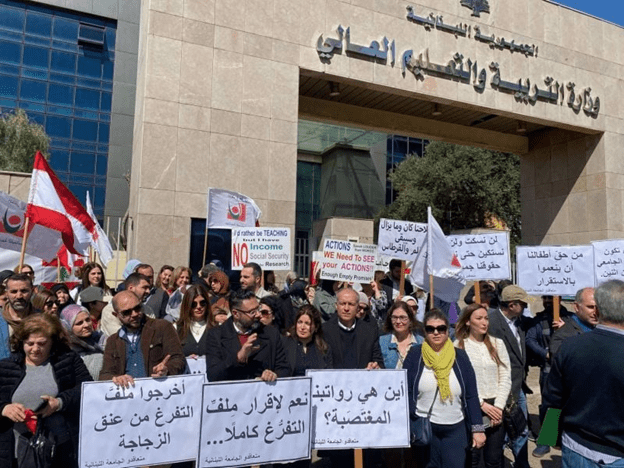By Dina Al-Amood | Staff Writer
Lebanese University (LU) professors staged a sit-in demanding fair compensation in front of the Ministry of Education and Higher Education headquarters in Beirut. Frustrated by a $2 hourly wage and unpaid salaries, LU’s Committee of Contractual Hourly Teachers threatened a full strike if their demands were not met. The Ministry of Education has yet to issue a public response.
The professors are protesting for a significant improvement in their working conditions. They are demanding a raise in their hourly wages (which were devalued to $2), regular monthly salaries, and access to essential benefits. Many professors are only seeking a middle ground between their current status and full-time employment. This “full-time part-time” status would offer some stability and potentially better benefits.
Zouheir Bachnak, a law professor with nine years’ seniority, told L’Orient Today, “We have no health cover, no affiliation to the National Social Security Fund, not even transport or attendance allowances, or even social assistance. The icing on the cake is that we still haven’t been paid for the 2022-2023 [academic school year]”.
The head of the Lebanese University, Dr. Bassam Badran, revealed some key numbers about the university’s staffing. The university has 1,600 professors on regular contracts catering to 63,000 students. Currently, there are also 3,000 professors working on hourly contracts. Out of these, 1,760 meet the qualifications for full-time part-time positions. This means they hold a doctorate and have at least two years of experience with a minimum teaching load of 200 hours per year.
But why haven’t the 1,760 professors who qualify to transition to full-time part-time positions done so yet? One reason for the stalling is the political class’ insistence on maintaining a denominational distribution of professors among religious sects. The number of Shi’ite professors applying for full-time roles far outnumbers applications from other sects. Just to illustrate the imbalance, there are 670 Shi’ite, 480 Sunni, 530 Christian, and only 60 Druze candidates competing for full-time status. Upholding this religious balance would likely mean rejecting a significant number of qualified Shi’ite professors. This is a concern because many (particularly Muslim professors) believe selection should be based on merit, not religious affiliation.
Years of frustration have boiled over, and professors feel undervalued by the state. They are not able to support their families on their current income and are exhausted from the crisis. This situation actively threatens the functioning of Lebanon’s only public university. Furthermore, the decades-long sectarian interference in LU’s internal affairs has crippled its ability to operate effectively. This outside influence, on top of a nationwide financial crisis, has pushed the university to the brink of paralysis.
Sources:
https://today.lorientlejour.com/article/1370408/lebanese-university-professors-strike-over-2-hourly-wage-and-unpaid-salaries.html
https://crisis24.garda.com/alerts/2024/03/lebanon-university-professors-to-protest-in-beirut-march-5

